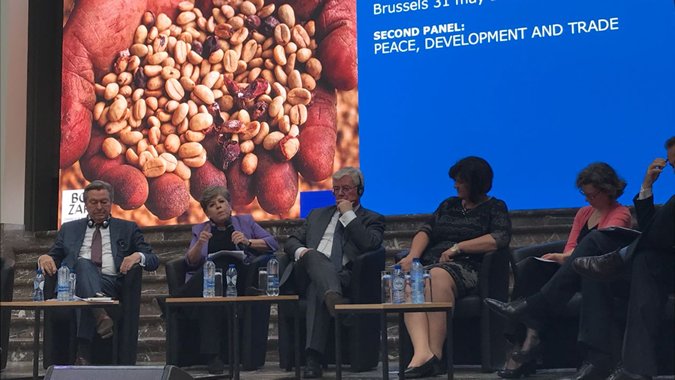Alicia Bárcena: Peace Process is Achievement of Colombians, Demonstrating Relevance of Multilateralism and Value of the Region’s Constructive and Respectful Support
ECLAC’s Executive Secretary participated in a high-level event at the headquarters of the European Union in Brussels, in which the Colombian peace process was analyzed.

The Executive Secretary of the Economic Commission for Latin America and the Caribbean (ECLAC), Alicia Bárcena, affirmed on Thursday that the peace process in Colombia constitutes the pillar of a new social compact for conflict resolution, the comprehensive construction of sustainable development and the closing of economic, social, productive and gender-related gaps.
The senior United Nations official participated in the high-level event Conflict Resolution in the 21st Century: the case of Colombia, which was held at the headquarters of the European Union in Brussels, Belgium, and which addressed the process for negotiating peace in the South American country.
The event was inaugurated by Juan Manuel Santos, the President of Colombia, and Federica Mogherini, High Representative of the European Union for Foreign Affairs and Security Policy.
In her remarks, Bárcena acknowledged “the fundamental role that two singular countries played in ending the conflict, Norway and Cuba, which were the guarantors of the process and which put all their diplomatic capacity at the service of this just cause, showing in these uncertain times the tangible value of multilateral endeavors. Along with Chile and Venezuela, which acted as facilitator countries, they provided invaluable lessons regarding respectful regional involvement to explore solutions to conflicts in our own region, with our own instruments.”
During her participation on the panel “Peace, Development and Trade,” ECLAC’s most senior representative affirmed that the consolidation of peace and the path of sustainable development require effective public institutions and participatory social contracts that create new spaces for citizen trust in the State’s institutions.
“The challenge begins now: the transformation of territories to gain trust with the expectation of achieving long-awaited equality, to dismantle the culture of exclusion, of privileges, which naturalizes inequality in Colombia and throughout our region,” she stated.
In her speech, Alicia Bárcena highlighted the leadership of President Juan Manuel Santos who “laid the foundations of a process that honors his homeland and makes Latin American and Caribbean people proud, and that by bringing positions closer with the FARC-EP they reaffirmed the vocation of our region as a region of peace.”
ECLAC’s Executive Secretary said that a negotiation and political conflict of the nature and magnitude of that experienced by Colombia “necessarily requires a medium and long-term vision that defines concrete mechanisms for economic development and the inclusion of traditionally excluded populations, as proposed by the civilizing global wager known as the 2030 Agenda.”
“Colombia showed visionary leadership upon proposing three ingredients in the Sustainable Development Goals: that they be universal, that they be cross-cutting in terms of equality, and that they have an integrating perspective to connect critical links and achieve that paradigmatic shift, because the reigning development model is not sustainable, because it concentrates wealth and creates inequality,” she sustained.
Alicia Bárcena added that “this is about a profound structural change in the modes of producing and distributing that addresses all the different aspects of inequality: territorial, income, wealth, gender, race and ethnicity-based.”
“It is about an equality that is not only ethically sound but also economically necessary because it is about using all political tools to make viable a development model of our own that guarantees economic, social and environmental sustainability,” she said.
ECLAC’s top representative highlighted Colombia’s initiative to break the statistical silence and develop original tracers and indicators for extremely diverse countries, both in terms of their culture and their natural wealth.
“Colombia has the accumulated experience to continue building peace and to contribute its lessons to the world, she concluded.”
Subregional headquarter(s) and office(s)
Country(ies)
- Latin America and the Caribbean
Contact
Public Information Unit
- prensa@cepal.org
- (56 2) 2210 2040